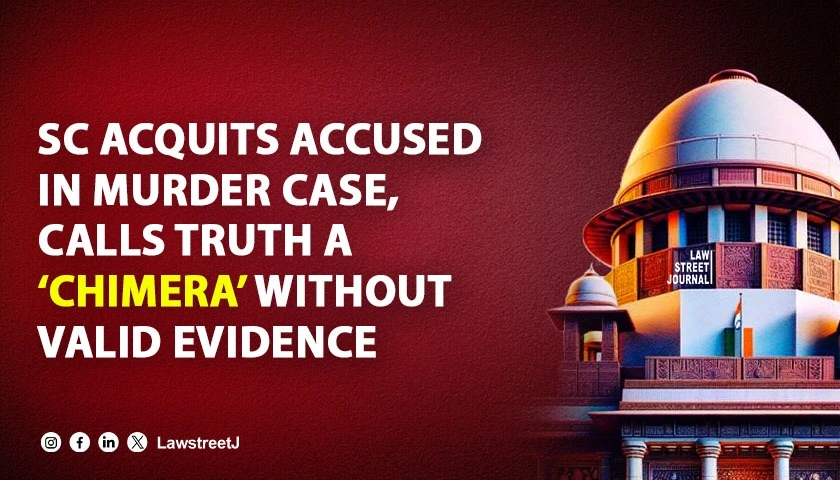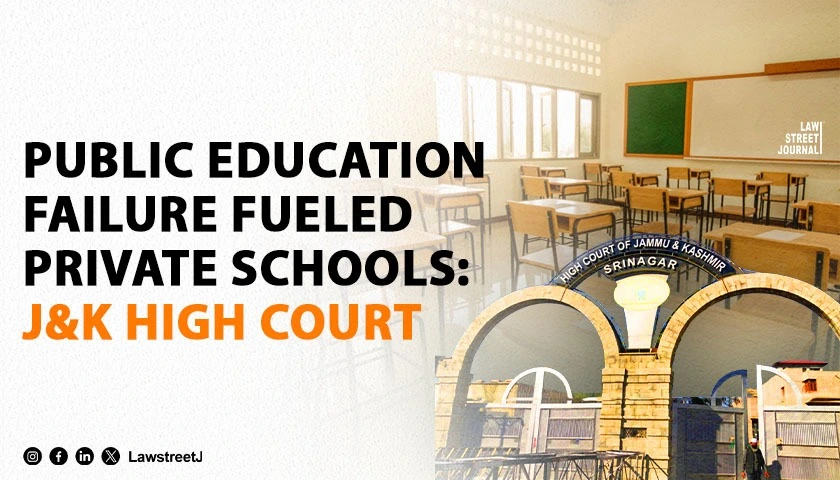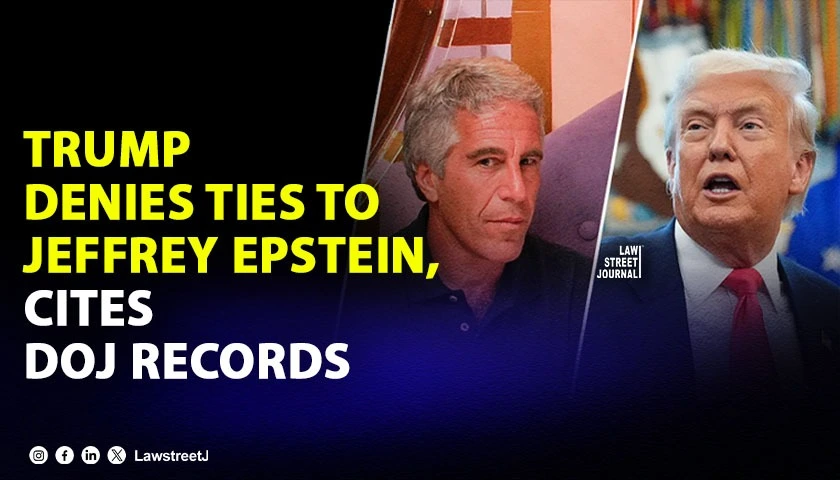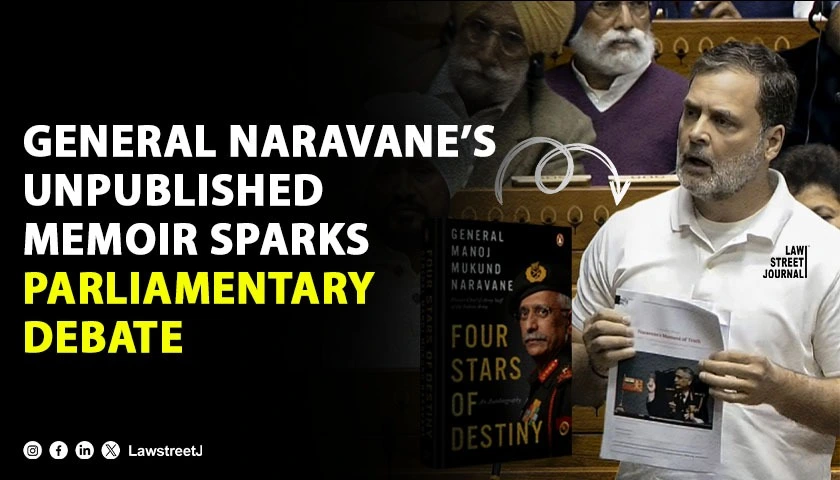NEW DELHI: The Supreme Court has on May 9, 2025 said truth is always a chimera and the illusion surrounding it can only be removed by valid evidence and the judges cannot tread the path of righteousness to enter into moral conviction in the absence of evidence.
The court set aside the Karnataka High Courts judgement which reversed acquittal of a director of a group of educational institutions and five others in a case of murder of an employee of his brother due to siblings rivalry.
"With a heavy heart for the unsolved crime, but with absolutely no misgivings on the issue of lack of evidence, against the accused arrayed, we acquit the accused, reversing the judgment of the High Court and restoring that of the Trial Court," a bench of Justices Sudhanshu Dhulia and K Vinod Chandra said.
The court allowed the appeal filed by Dr Renuka Prasad and others against the High Courts judgment of September 27, 2023 and October 5, 2023 which held the appellants guilty of the murder of Prof A S Ramakrishna, administrative officer of KVG Medical College in Dakshina Kannada district on April 28, 2011.
Having examined the matter, the bench said the High Court has egregiously erred in convicting the accused on the evidence led and has jumped into presumptions and assumptions based on the story scripted by the prosecution without any legal evidence being available.
"We can only accede to and share the consternation of the Division Bench of the High Court, which borders on desperation, due to the futility of the entire exercise. That is an occupational hazard, every judge should learn to live with, which cannot be a motivation to tread the path of righteousness and convict those accused somehow, even when there is a total absence of legal evidence; to enter into a purely moral conviction, total anathema to criminal jurisprudence," the bench said.
The court pointed out truth is always a chimera and the illusion surrounding it can only be removed by valid evidence led, either direct or indirect, and in the event of it being circumstantial, providing a chain of circumstances with connecting links leading to the conclusion of the guilt of the accused and only the guilt of the accused, without leaving any reasonable doubt for any hypothesis of innocence.
"Prevaricating witnesses, turning hostile in Court and overzealous investigations, done in total ignorance of basic tenets of criminal law, often reduces prosecution to a mockery. Witnesses mount the box to disown prior statements, deny recoveries made, feign ignorance of aggravating circumstances spoken of during investigation and eye witnesses turn blind," the bench said.
Here is a classic case of 71 of the total 87 witnesses including eye- witnesses, turning hostile, leaving the prosecution to stand on the testimony of the police and official witnesses. Even a young boy, the crucial eyewitness, who saw his father being hacked to death, failed to identify the assailants, the bench pointed out.
The court emphasised Section 161 statements of various witnesses who were questioned by the police during investigation are wholly inadmissible under Section 162 of the CrPC. Merely because the IOs spoke of such statements having been made by the witnesses during investigation, does not give them any credibility, enabling acceptance, unless the witnesses themselves spoke of such motive or acts of commission or omission or instances from which conspiracy could be inferred as also the preparation, established beyond reasonable doubt, it said.
When the statements recorded under Section 161 of the Code of Criminal Procedure is resiled from, there arises a possibility that the police coerced such statements, but considering the huge prevalence of such instances, as in the present case, of the entire witnesses turning hostile, there could be various other factors also. It could be for fear of deposing against the accused, political pressure, pressure from family or society and even instances of monetary consideration, the bench said.
The prosecution alleged that due to differences arising from sharing of assets of the father; an entrepreneur, Kurunju Venkataramana Gowda, the founder of KVG Academy of Liberal Education, who set up several educational institutions, A1, Dr Renuka Prasad and his brother, PW4, K V Chidananda were at loggerheads. The deceased, an employee of one of the institutions, later allotted to the share of A1, resigned to join an institution managed by PW4, after the division of assets. The enmity of A1 arises, according to the prosecution, due to the active involvement of the deceased in the sibling rivalry, aligning himself with PW4, to the hilt. It was alleged A1 along with his employees A2 to A4 engaged A5 and A6, through A7, an Advocate, to murder the deceased. A5 and A6 are said to have carried out the brutal murder, hacking the deceased to death, in front of his son, PW8, at 07:45 pm on April 28, 2011.
Going through the evidence, the bench said, according to us the motive insofar as A1 having inimical feelings against the deceased, for having meddled in the affairs of the institutions and the division of assets, does not stand proved. The brother of the main accused only admitted to certain differences between the brothers with reference to the running of a mess in the college and there was no reference to the deceased in so far as the specific dispute spoken of. The court found absolutely no reason to find the motive established.
Having considered other evidence, the bench said, "We are unable to find either the motive, the conspiracy or the preparation or even the crime itself to have been established in Court, at the trial through the witnesses examined before Court."
The court noted the witnesses had turned hostile, for reasons best known to themselves. The only inference possible, on the witnesses turning hostile is that either they have been persuaded for reasons unknown or coerced into resiling from the statements made under Section 161 or that they had not made such statements before police officers. Merely because the story came out of the mouth of the IO, it cannot be believed and a legal sanctity given to it, higher than that provided to Section 161 statements under Section 162 of the CrPC, it said.
In the present case, the court said that there are not even two views coming forth from the evidence. The only view that comes forth is that the prosecution completely failed to prove the allegations raised and charged against each of the accused, more by reason of all the witnesses paraded before Court, at the trial, having turned hostile for reasons unknown.
"Whatever be the reason behind such hostility, it cannot result in a conviction, based on the testimony of the Investigating Officers which is founded only on Section 161 statements and voluntary statements of accused; the former violative of Section 162 of the CrPC and the latter in breach of Sections 25 & 26 of the Evidence Act," the bench said.

















